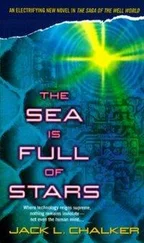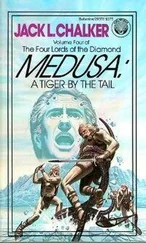Jack Chalker - Cerberus - A Wolf in the Fold
Здесь есть возможность читать онлайн «Jack Chalker - Cerberus - A Wolf in the Fold» весь текст электронной книги совершенно бесплатно (целиком полную версию без сокращений). В некоторых случаях можно слушать аудио, скачать через торрент в формате fb2 и присутствует краткое содержание. Год выпуска: 1982, ISBN: 1982, Издательство: Del Rey / Ballantine, Жанр: Фантастика и фэнтези, на английском языке. Описание произведения, (предисловие) а так же отзывы посетителей доступны на портале библиотеки ЛибКат.
- Название:Cerberus: A Wolf in the Fold
- Автор:
- Издательство:Del Rey / Ballantine
- Жанр:
- Год:1982
- ISBN:0-345-29371-1
- Рейтинг книги:4 / 5. Голосов: 1
-
Избранное:Добавить в избранное
- Отзывы:
-
Ваша оценка:
- 80
- 1
- 2
- 3
- 4
- 5
Cerberus: A Wolf in the Fold: краткое содержание, описание и аннотация
Предлагаем к чтению аннотацию, описание, краткое содержание или предисловие (зависит от того, что написал сам автор книги «Cerberus: A Wolf in the Fold»). Если вы не нашли необходимую информацию о книге — напишите в комментариях, мы постараемся отыскать её.
Cerberus: A Wolf in the Fold — читать онлайн бесплатно полную книгу (весь текст) целиком
Ниже представлен текст книги, разбитый по страницам. Система сохранения места последней прочитанной страницы, позволяет с удобством читать онлайн бесплатно книгу «Cerberus: A Wolf in the Fold», без необходимости каждый раз заново искать на чём Вы остановились. Поставьте закладку, и сможете в любой момент перейти на страницу, на которой закончили чтение.
Интервал:
Закладка:
“They did,” I told her. “They created a corps of specialists in the Confederacy for people who thought like this, to catch them.”
“Sounds fascinating. But surely somebody by now would have designed a foolproof system.”
I had to laugh. “The ultimate foolproof system is invented every year or two and has been since the dawn of time. It usually lasts only until the next genius figures out how to beat it.”
Even you, Wagant Laroo, I thought, looking out across the ocean to the southeast. No fortress has ever proven impregnable, nor is the best security without flaw. I’m coming for you, Wagant Laroo. One day, step by step, I’m coming. And not even your alien friends will be able to save you from me.
Despite my glib assurances to Sanda, I didn’t trust any bootlegger for anything. Wednesday I checked out the circuits in the lab. It was a fascinating business, a computer so small you could hardly see it with the naked eye, but it was naturally centuries out of date. What could be done with computers now was nothing short of awesome—but it hadn’t been done, out of fear by power-loving, weak-kneed leaders who feared just who or what would be in control of humanity if they went too far. Here on Cerberus, where the system was even more retarded, I suspect that scientists from centuries earlier could probably have understood what I was doing.
Human history had always been like that—centuries, even millennia, of incredibly slow, creeping advance, followed by a few centuries of exponential multiplication of knowledge, followed by a collapse, a setback, and more lengthy periods of backwardness. We are hardly as backward as some, but the analogy still held. This was not an age of great advancement, if only for political reasons, nor the century for it. We were Neanderthals, primitives who could set the air conditioner on in our caves and drive comfortably down to the dinosaur pits.
The chips checked out perfectly. Otah’s people had done a good job, and now it was up to me to be worthy.
Wednesday evening I checked out a company flier, which wasn’t unusual, since I was due the next day in Comora, about a hundred and ten kilometers north, for a reorganizational meeting—standard stuff. What wasn’t standard was where I went that evening after changing into a Tooker Service Systems uniform and, with a little easy sleight of hand, picking up an official repairman’s tool kit.
My first stop was an apartment complex eight kilometers west of the main plant. My authentic Tooker ID badge got me easy entry—they didn’t even take note of the name, just that its face and mine matched—-and soon I was in the manager’s office.
“The entire city master alarm system is undergoing an overhaul,” I told her. “We’ve been having breakdowns all up and down the line. You can’t really tell if the damn stuff goes bad until it does, but they want me to check the line anyway.”
“Go ahead,” she told me, not really concerned. “It’s on level four, just above waterline.”
I nodded, told her thanks, then added, “This system’s so much of an antique maybe they’ll get sick of these things and put in a new one.”
“Ha!” she exclaimed. “Not until the Municipal Building itself burns down, or the fancy homes fill with water!”
I took the service elevator down and quickly found the master line that routed the fire alarm system to each floor and each room. One weakness of the system I’d spotted right away was the fact that people had to build in the trees—they couldn’t kill the trees or replace them for lack of a foundation. And since the bulk of the plants were underwater, the tops were generally hollow and the circulatory systems were not extensive, as well as being exposed to the sun.
In other words, no matter how inert the materials used inside the tree buildings themselves, the outer bark was highly flammable, and was covered by a municipal alarm system. Although it was almost impossible to set fire to anything inside the man-made structures, you were always completely surrounded by the tree and had a fair way to go to exit. Fire would be a severe problem, with smoke potentially blocking all the exits.
The computer fire alarm system, then, was designed to detect any temperature rise anywhere in the exposed tree by the use of a selective monitoring system at all levels above the waterline. Other than this early warning system, the only real escape was by the chutes, which could shoot you from any hall to the waterline. These areas had special systems to keep them free of smoke and were for the most part in the center, where everything was man-made and insulated.
There were few fires, and even fewer than ever amounted to anything. Hence the alarm system as such had been mostly ignored for years, considering borough budgets.
I was not out to start any fires. I ran a systems check, stopping at predetermined points, and then replaced the tiny, almost microscopic chips with specific ones I’d brought with me, being careful even to spray a bit of dust and gunk on them so that there would be no evidence of replacement. Anyone removing one would probably complain about how dirty the area was and remark that it was no wonder the chips had gone bad.
I’d never done this with a fire alarm system before, but I’d done similar things countless times to security systems far more complex and technologically advanced than this. I’d never been found out once—even when they suspected what had been done.
It took less than half an hour to place all my key-chips, but I had more stops to make, hitting the usual maintenance route mapped on the shop board. In the other places I did absolutely nothing, but anyone checking on the mysterious serviceman would find that he’d done nothing not routine and that in fact the servicing had been ordered and logged. I knew it had: I’d slipped the order in myself, then made sure it wouldn’t come up on the assignment board so I could take it.
Modern man, I’m convinced, is vulnerable to any competent engineer. We depend on the computer to total our purchases, rarely checking each item for accuracy, and we rely on it for inventory, for security, for remembering to turn out the lights and remembering to keep the temperature in our homes at the same level no matter what. We trust them so much and take them so much for granted that most people can be had by simply nudging a computer to suggest what you want it.
By the time I’d reached the fire department I was well satisfied and had made about thirty stops on this particular system. According to service records at Tooker, false alarms were relatively common at almost every station, averaging two a week, so systems checks were routine—and pointless. At the fire station I removed and replaced the rest of my bootleg load in several places, and then left for the plant once again. Changing back to my normal clothes, I used my company pass to get back into inventory, where I replaced the tool kit and threw the uniform into the company laundry chute.
Then I went home.
The next morning I flew up to my conference, returned in the afternoon, and checked out early, going back down to maintenance and punching up their service record.
Two chips had gone bad at an apartment complex eight kilometers west of the plant, one around noon and the other not too long before I checked. The repair personnel were still on the job for that one. I smiled to myself, nodded, and went home for an early dinner.
By Friday there had been seven failures within the system, some at the apartment house, some through the system and apparently in the master control at the fire station, ringing every alarm on that particular string. There had also been one false alarm at another apartment—one I wasn’t responsible for but had hoped for, considering the average two a week. It would keep my tampering from being obvious, although I couldn’t imagine why any investigator or Tooker tech would even consider that somebody had gone to a lot of trouble and expense to ring false alarms.
Читать дальшеИнтервал:
Закладка:
Похожие книги на «Cerberus: A Wolf in the Fold»
Представляем Вашему вниманию похожие книги на «Cerberus: A Wolf in the Fold» списком для выбора. Мы отобрали схожую по названию и смыслу литературу в надежде предоставить читателям больше вариантов отыскать новые, интересные, ещё непрочитанные произведения.
Обсуждение, отзывы о книге «Cerberus: A Wolf in the Fold» и просто собственные мнения читателей. Оставьте ваши комментарии, напишите, что Вы думаете о произведении, его смысле или главных героях. Укажите что конкретно понравилось, а что нет, и почему Вы так считаете.












